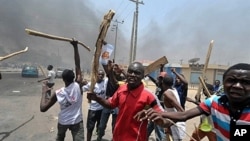Incumbent President Goodluck Jonathan is leading in results from Nigeria's election, sparking riots in several northern cities that supported his main rival. Despite continued violence, voting observers said the elections were a large improvement over past polls.
Results posted on the website of Nigeria's National Independent Electoral Committee show incumbent President Goodluck Jonathan winning 23 of the 33 states for which results are available.
To avoid a run-off, Jonathan must win a simple majority and at least a quarter of the vote in 24 of the nation's 36 states, a threshold he is close to reaching.
Jonathan was highly favored to win the elections, and an opinion survey released before the poll showed him with a double-digit lead over his closest competitor, former military ruler Muhammadu Buhari.
Riots broke out Monday in the northern cities of Kaduna and Kano, Buhari strongholds, where voters disgruntled with the results burned tires, cars and buildings.
While casting his vote Saturday, Buhari made clear he was unhappy with some reports of discrepancies at polling stations, but said his party, the CPC, would ultimately decide whether to challenge the outcome.
“I already said this time around I am not going to court, but my party may decide to go to court.”
Saturday's poll was the second in a three-part general election being held in April. Despite instances of voter intimidation, including a few isolated bomb attacks, elections observers say there has been a marked improvement from past elections.
Observers with the National Democratic Institute monitoring group told a news conference the elections were a step forward for the country, but urged continued vigilance as Nigeria prepares for the last of its three polls this Saturday.
A leader of the monitoring delegation, Robin Carnahan, said the National Independent Electoral Committee in particular had made improvements after getting off to a rocky start.
"The delegation also commends efforts by INEC's staff, at all levels, to improve transparency and credibility. And in a very in a short time after the April 9 elections, they also continue to make improvements. For example, they improved considerably on the distribution of polling materials. They made efforts to amend the voter registry to include voters who had been wrongly excluded before. These are all things we applaud.”
Other observers, including the African Union and ECOWAS regional bloc, echoed Carnahan's findings, praising Nigeria for committing itself to free and fair elections.
April's elections are testing Nigeria's resolve to hold credible and open elections for the first time since its return to democracy after the end of military rule in 1999.
The presidential poll attracted millions more voters than legislative elections the week before. Heavy turnout also is expected for state polls on April 26, in which Nigerians will elect governors.
Nigerian President Set to Win Poll












